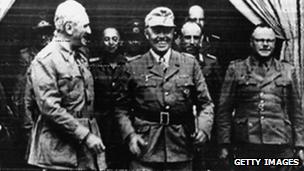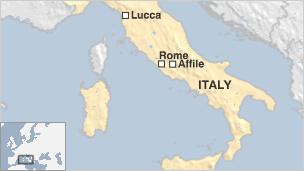Italy memorial to Fascist hero Graziani sparks row
- Published

Graziani (left) is seen here with German Field Marshal Albert Kesselring in October 1944
A political row has erupted in Italy after a memorial was opened to fascist commander Field Marshal Rodolfo Graziani, a convicted war criminal.
Graziani was honoured with a mausoleum and memorial park, built at taxpayers' expense, in a village south of Rome.
He was notorious as Benito Mussolini's military commander in colonial wars in Ethiopia and Libya where he carried out massacres and used chemical weapons.
Italy's main leftist party has protested against the commemoration.
"Is it possible to allow, accept or simply tolerate that, in 2012, we dedicate a park and a museum to the fascist general and minister Rodolfo Graziani?" asked Esterino Montino, head of the Democratic Party in the Lazio region.
He pointed to the "crimes against humanity committed by Graziani in Ethiopia in the 1930s", La Repubblica newspaper reports.
Graziani was sentenced to 19 years' imprisonment for war crimes in 1948 but was released from jail after serving only two years, and died in 1955.
'Butcher of Fezzan'
The BBC's David Willey, in Rome, says that the cult of fascist heroes remains alive in certain parts of Italy despite the outlawing of the fascist party in the country's postwar constitution.
He adds that it is curious, however, that there has been no formal protest that a crypto-fascist mayor of a small town near the capital can, in 2012, publicly honour a man who brought death to thousands of Africans and dishonour to his own country.
The mayor of the village of Affile attended the opening ceremony on Saturday, together with a representative from the Vatican.
Although almost unknown to modern generations of Italians, the Fascist military officer was known as the Butcher of Fezzan for the executions of Libyans he ordered while military governor of Cyrenaica in North Africa, our correspondent says.
He used poison gas and chemical weapons against Ethiopian tribesmen during Italy's colonial war in what was then called Abyssinia.
Towards the end of the war, Graziani was appointed defence minister by Mussolini in the short-lived Fascist Republic of Salo.
He commanded Italian troops alongside the Germans at the Battle of Garfagnana in December 1944, one of the last military victories of the Axis forces.
According to La Repubblica, the mausoleum in Affile cost 127,000 euros (£100,000; $157,000).
About 100 people attended its inauguration, the paper adds.
Mayor Ercole Viri was quoted as saying the memorial was of national importance and dismissing criticism as "idle chatter".
Photos of the opening ceremony, external were posted in a gallery on the village's website, which lists Graziani as one of the village's "famous sons". Engraved on the mausoleum are the words "Fatherland" and "Honour".
There is another side to Italy's often schizophrenic attitude to its recent history, our correspondent adds.
Another ceremony was held the same weekend marking the anniversary of a tragic massacre of 560 Italian men women and children by German SS troops as a reprisal in a small town near Lucca, in Tuscany.

Martin Schulz, the German Social Democrat and president of the European Parliament, was present in Sant'Anna di Stazzema on Sunday.
He said: "I am a German and the language I speak is the same of those who committed those crimes. I shall not forget that."
Writing on Twitter, external, he added: "Europe is our answer to the crimes of the last century - it is also our best chance for the future."
- Published15 July 2012